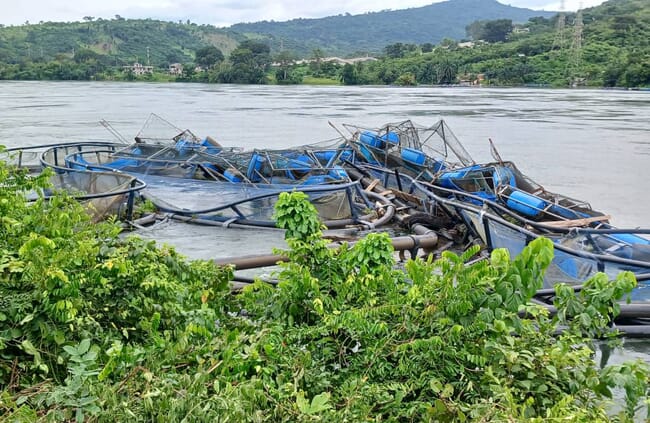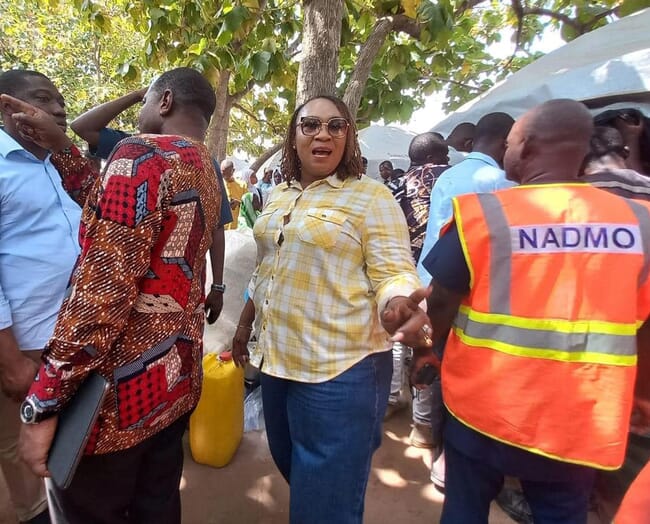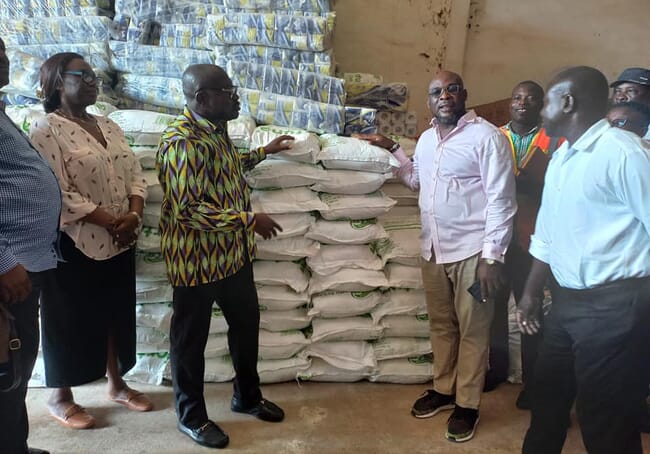
The floods in September and October of this year were caused by the spillage of water from the Akosombo Dam by the Volta River Authority
The floods have caused more damage than initially estimated, and tilapia prices have already began a steady climb, as supply is not expected to begin recovery until the middle of next year. Farmers are keenly expecting relief funds from the government to help them resume production.
Caused by the spillage of water from the Akosombo Dam by the Volta River Authority, the floods overwhelmed homes, crop, vegetable and fish farms. A massive mobilisation effort by various groups delivered emergency supplies to people in the affected communities, and the Minister of Agriculture announced the allocation of $40 million (€37 million) from the World Bank-funded Food System Resilience Programme.
Extent of the damage
In addition to visiting the affected communities to deliver relief items, Minister of Fisheries and Aquaculture Development Mavis Hawa Koomson met leaders of the Ghana Aquaculture Association (GAA) and other stakeholder associations, and asked for a detailed report on the fish farmers whose operations had been affected, and the extent of the damage. She cautioned that whilst fish farmers would be provided with some support, the floods had raised issues of sanitation and environmental protection which could not be ignored. Cemeteries, mortuaries and waste disposal sites have been overrun, and their impact on fish farming had to be considered.

Minister Koomson has cautioned that whilst fish farmers would be provided with some support, the floods had raised issues of sanitation and environmental protection that could not be ignored
Minister Koomson also said that the floods had raised the issue of the report of the Volta Lake Zonation project conducted by the Water Research Institute. It was carried out to help ensure the orderly and sustainable development of aquaculture in the lake area, and to determine the locations best suited for fish farming. Although the report was presented to the public in January 2018, its recommendations are yet to be implemented, and it is expected that the flooding will lead to new measures being introduced to prevent future disasters and to ensure sound fish farm activity.
Funding support
Some affected farmers are hopeful that the funds will enable them to get back on their feet. Ben Winful, who lost most of his farm infrastucture, stated: “With some decent support I can start on my way to recovery. Fish farming is a capital-intensive business. It costs good money to set up one cage system, and I have lost 50. Some of my colleagues have lost over 100. We are asking government to provide meaningful help to enable us start over”.
However, Habib d’Angelo, CEO of Volta Rapids Fish Farm and vice-president of the Ghana Aquaculture Association, is less optimistic.
“I hope we get enough support to enable most of us to recover, but the question is whether government can come up with the quantum of resources needed. Fortunately, some enterprises that are involved in other business ventures have started rebuilding, but some fish farmers may not be able to resume. The GAA is doing what it can to ensure that some modest help reaches our colleagues soonest, because about 50 percent of national aquaculture production has been lost, and we need to recover it as quickly as possible, or we face the risk of illegal, inferior tilapia imports,” he observed.

Minister Anim announced on 20 November that the Ghanaian government would soon introduce a relief package for farmers affected by the floods
Ghana’s National Aquaculture Plan (2023-2027) targets 211,000 metric tonnes of aquaculture production. The Volta floods is certainly a setback, but farmers believe that it is possible to achieve and even exceed the target. There has been a massive surge of interest in fish farming, with a significant number of investors going into catfish production.
Mabel Quarshie, CEO of Aquatic Foods and treasurer of the GAA, said: “I have been producing tilapia and catfish sausages and crackers and salted tilapia for some three years, and this year has been good. We are hoping that we will soon get the certification to export to the EU, which has been in the pipeline for a while. That will also open the US market to us. I regard the Volta floods as a temporary setback. We will overcome them.”
Lake protection
Some experts believe that Lake Volta still provides a useful model for fish farming in Africa. Dr E. T. Mensah, senior research scientist at the Aquaculture Research and Development Centre, argues that there are better locations for farming.
“We should be looking at culturing upstream of the lake rather than downstream. The floods occurred downstream, and there is a possibility of a recurrence if we do not take the necessary action,” he suggests.
Meanwhile Dr Kofitsyo Cudjoe, a senior adviser at the Norwegian Veterinary Institute’s Aquatic Animal Health and Welfare Department and leader of the Norway-Ghana Tilapia Initiative (NORGHATI), who has led a number of aquaculture projects in Ghana and other African countries, sees things differently.
“There is a very serious aspect of the flooding which is not being discussed, and that is the consequences of continuous farming on the lake. Fish farming must be a land-based operation. We must plan to move all farms onto the land now. No new cages must be allowed on the lake. We must protect biodiversity and mitigate the ecological harm caused. We must protect the lake,” he argues.
It is unlikely that radical steps will be taken in the short term. Indeed, the Deputy Minister of Fisheries and Aquaculture Moses Anim, announced on 20 November that government would soon introduce a relief package for fish farmers affected by the floods.
But several other voices like Dr Kofitsyo Cudjoe are speaking out about environmental issues on the lake, and they are unlikely to be ignored for long.




